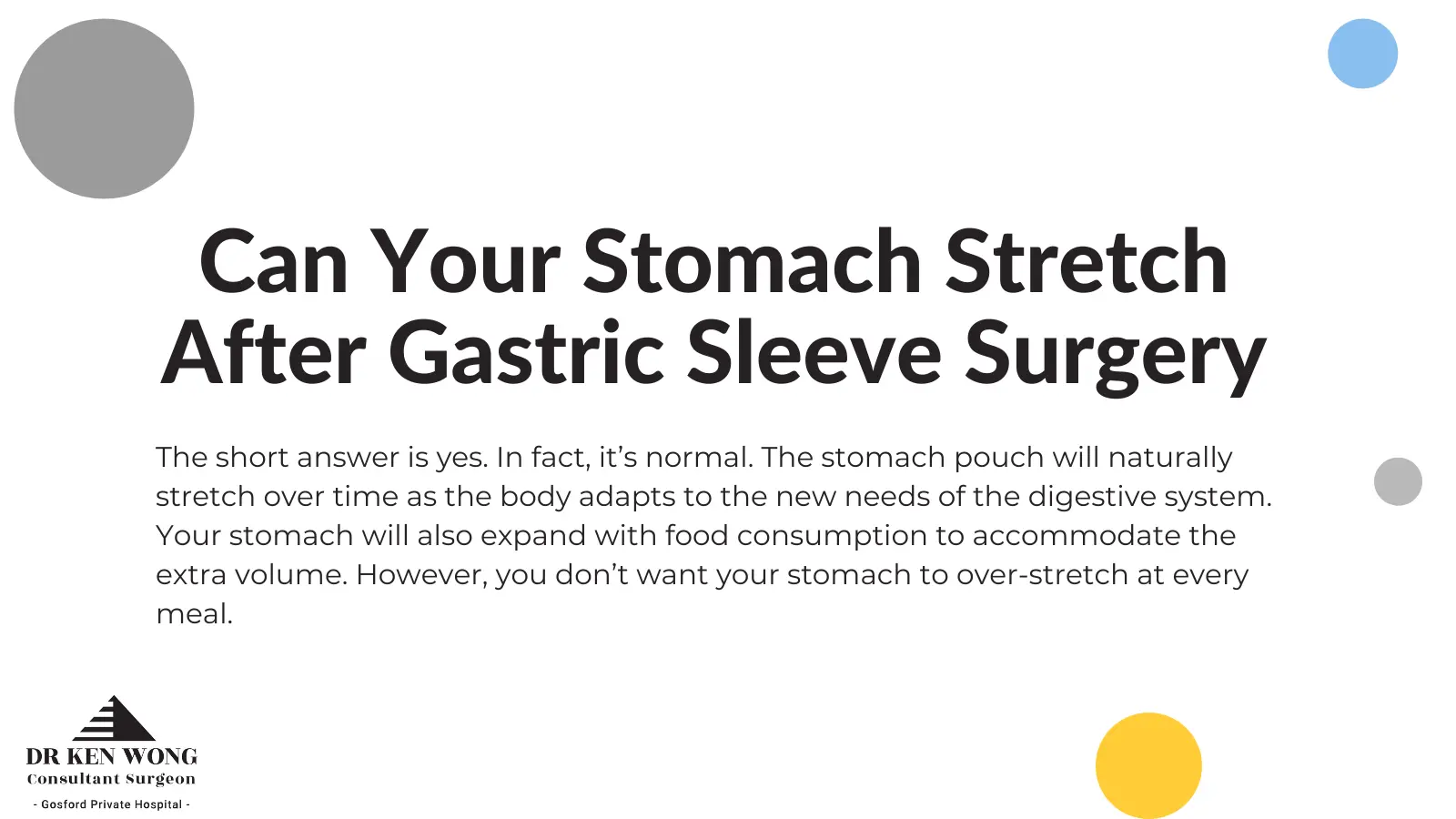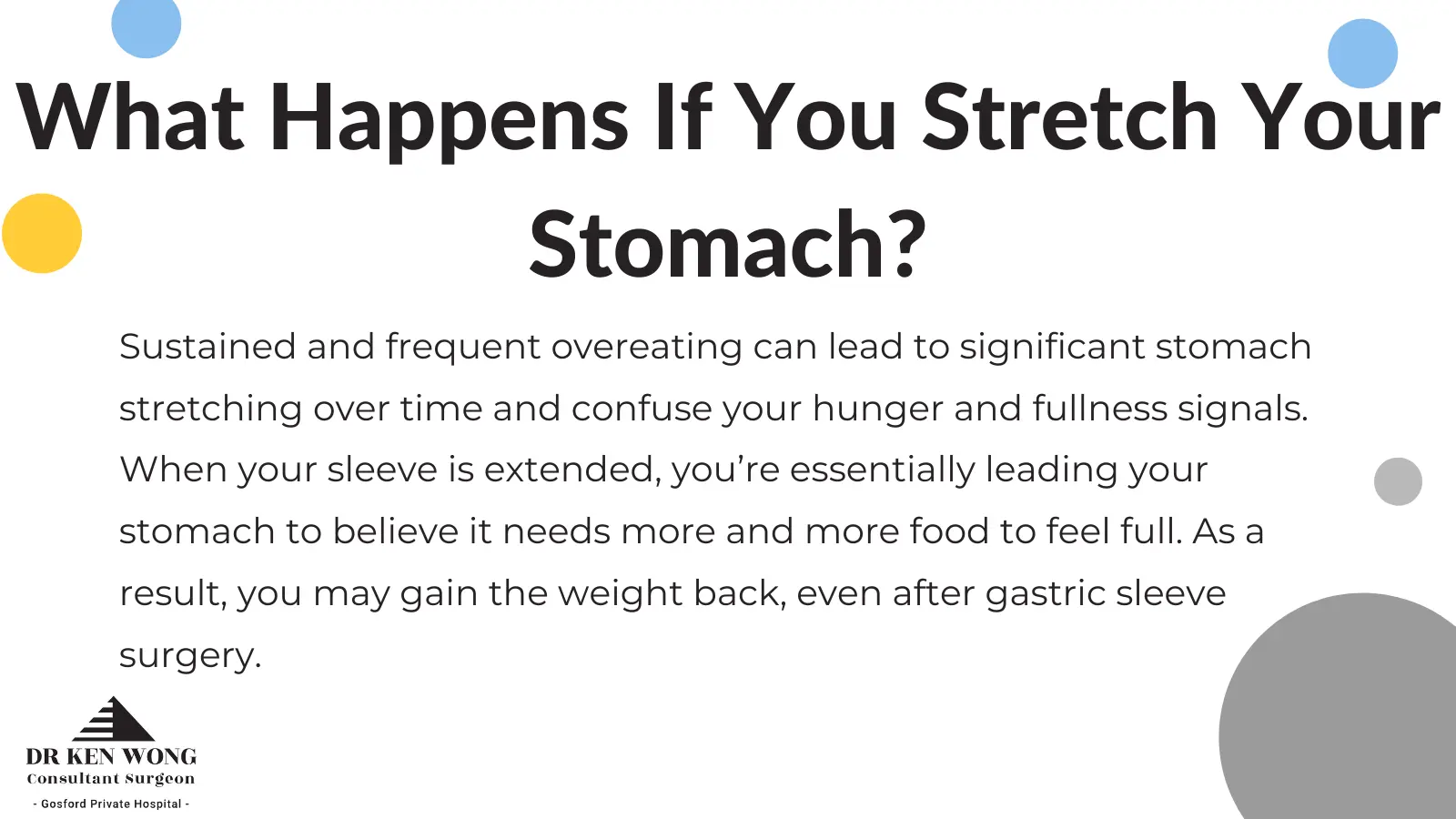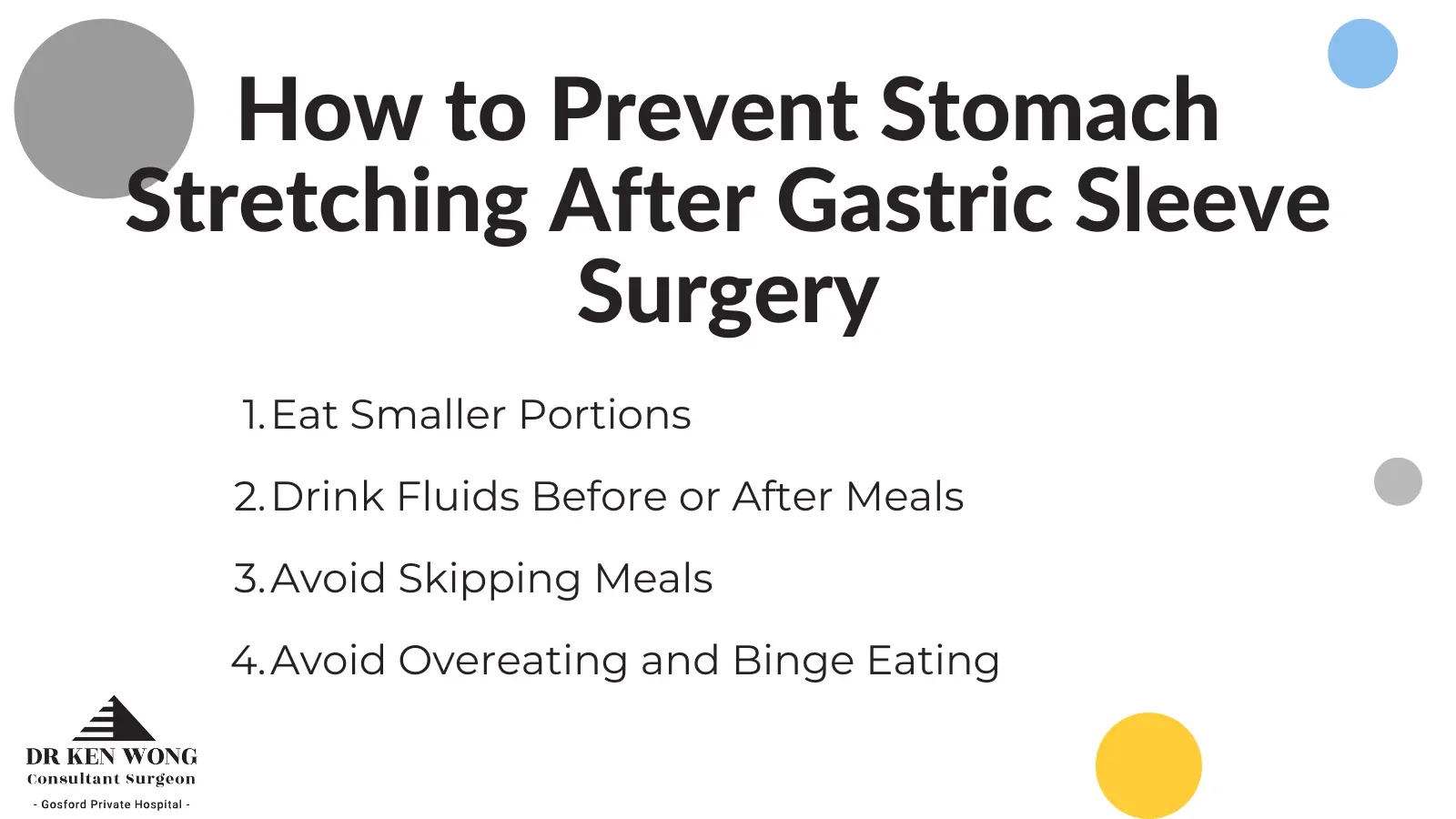Bariatric surgery is a lifeline for severely obese patients who feel they have tried and tested every diet and exercise regime on the market. The invasive operation will effectively limit the number of calories you can consume comfortably, helping you maintain a healthy, nutrient-rich diet and reduce the risk of weight-related health issues.
Weight gain generally occurs as the result of the stomach stretching over time to accommodate for larger amounts of food. And while gastric sleeve surgery is extremely effective as it condenses the size of your stomach, it is understandable as to why many patients are concerned about stomach stretching after surgery.
Gastric sleeve surgery (or laparoscopic sleeve gastrectomy) involves the permanent reduction of your stomach by approximately two thirds. Medical instruments are inserted through a keyhole incision to excise a large portion of the stomach, leaving behind a small pouch or a ‘sleeve’. Keyhole surgery reduces scarring, post-surgical recovery time and potential complications.
Undergoing gastric sleeve surgery is a permanent solution for weight loss. The smaller pouch leaves less room for food, limiting your overall food intake and greatly assisting with a caloric deficit. However, the true benefit of gastric sleeve surgery is the removal of the gastric fundus, the stomach area where grehlin, the hunger hormone, is created. Lower ghrelin levels make people feel less hungry and less inclined to over-indulge, ideal for weight loss.
As the leading Central Coast gastric sleeve clinic, we’re here to provide guidance around what you can expect with the operation. This article will provide all the answers to your question “can your stomach stretch after gastric sleeve?”, and give an in-depth review of the recommended diet practices after gastric sleeve surgery to minimise weight regain and the potential for stomach stretching.
Can Your Stomach Stretch After Gastric Sleeve?
Technically, the stomach can stretch after gastric sleeve surgery. However, it all comes down to sticking to a healthy, balanced lifestyle post-surgery.
For the most part, it’s likely for patients to increase their food intake and portion sizes over time.

So, can you stretch your stomach after bariatric surgery?
The short answer is yes. In fact, it’s normal. The stomach pouch will naturally stretch over time as the body adapts to the new needs of the digestive system. Your stomach will also expand with food consumption to accommodate the extra volume. However, you don’t want your stomach to over-stretch at every meal.
While normal stomachs can stretch to more significant amounts of food intake in one sitting, a stomach after a gastric sleeve is less capable. Permanent stomach stretching may occur due to poor eating habits sustained over more extended periods, requiring several months, if not years, to occur. Frequent overeating can lead to stretching, stall weight loss or even promote weight gain. Your stomach cannot hold and digest nearly as much food as it could before surgery, so it is essential to implement certain eating behaviours and lifestyle changes to aid in your recovery and prevent possible bariatric complications. Following surgery, your bariatric surgeon will recommend eating regular, small, portioned meals to keep you satiated and reduce the chance of stomach over-expansion.
Significant weight gain can occur as a result of suppressing hunger signals. Therefore, the key is to listen to your natural hunger and fullness cues to prevent excessive stomach stretching.
What Does Stretching Your Stomach Do?
A ‘normal’ stomach is built to adapt to food consumption. However, a gastric sleeve stomach pouch is incapable of stretching to accommodate larger quantities of food. Following surgery, if you overeat, you will likely feel nauseous and experience vomiting, making it difficult to gain weight.
Stomach stretching can render your gastric sleeve operation ineffective for weight loss.
Contrary to popular thought, the size of your pouch is not the direct cause of weight gain after bariatric surgery. Weight gain occurs due to a caloric surplus, which is more calories in than you burn. A smaller pouch only acts as a weight loss aid, encouraging patients to eat less naturally, roughly ¾ of a metric cup in one sitting. So, while a stretched poach is not the direct cause of weight gain, it can confuse your hunger cues and ability to feel full and satisfied after an adequately portioned meal.

Sustained and frequent overeating can lead to significant stomach stretching over time and confuse your hunger and fullness signals. When your sleeve is extended, you’re essentially leading your stomach to believe it needs more and more food to feel full. You might experience hunger cues when you are still half-full rather than when your stomach is empty and you need nourishment. As a result, you may gain the weight back, even after gastric sleeve surgery. Patients must understand what eating behaviours and lifestyle changes they can adopt to minimise the potential for stomach stretching and weight regain.
How to Prevent Stomach Stretching After Gastric Sleeve Surgery
Gastric sleeve surgery reduces the space in your newly constructed stomach pouch to approximately a third of its original capacity. As a result, after surgery, patients will likely have to adjust their eating behaviours.
1. Eat Smaller Portions
To ensure you don’t overstress and stretch your stomach post-surgery, eat a small portioned meal every 3 to 4 hours, as your bariatric doctor prescribes. Choose protein-dense, balanced meals, chew slowly, thoroughly, and mindfully and end a meal feeling full and satisfied. Patients can also incorporate small snacks throughout the day to keep satisfied and prevent the temptation to overeat later. Regardless, to maintain a steady decrease in weight, stick within your recommended calorie intake every day.
2. Drink Fluids Before or After Meals
Fluid intake while you eat a meal can dilute your stomach acid and disturb your digestion and lead to vomiting. With limited space in your stomach following gastric sleeve surgery, compromising your digestion can result in stomach stretching. Aim to reduce your fluid intake at meals; only drink water, tea, or juices 20 to 30 minutes before your meal to allow your stomach to process the input and promote a healthy, functioning digestive system. Strive to eliminate carbonated and sugary beverages from your diet altogether.
3. Avoid Skipping Meals
Patients who have undergone gastric sleeves are often inclined to skip meals as a healthy aid in reaching their weight loss goals. However, in reality, the opposite is true. Skipping meals can lead to limited caloric intake and metabolic adaptation; it compromises the nutrients vital to your health and recovery after bariatric surgery. Further, skipping meals can send your body into starvation mode, leading to overeating later. Aim to stick to a structured diet plan and always have healthy, protein-rich snacks on hand to maximise your weight loss results and avoid stomach stretching.
4. Avoid Overeating and Binge Eating
Binge eating and overeating can result in inconsistent hunger signals, increasing the likelihood of falling into an overeating or binge-restrict cycle that can contribute to stomach stretching amongst other associated risks: acid reflux, abdominal pain and dumping syndrome. Occasionally overeating is unlikely to have any long-term repercussions, so enjoying a larger meal on a special occasion or holiday shouldn’t be a concern. However, frequent overeating can be highly harmful following gastric sleeve surgery. Some habits to implement in your day-to-day are measuring your food portions, following your diet recommendations and consulting your bariatric medical practitioner if you seek further advice.
Patients who overeat to cope with heightened or lowered emotions, stress or boredom should seek other coping mechanisms or seek professional help.
To reduce overeating, try implementing the following healthy habits:
- Reduce stress
- Remove temptation
- Eat regular, portioned meals
- Eat nutrient-dense, fibre-filled, and protein-rich foods
- Eat slowly and mindfully
- Avoid being too restrictive; allow yourself a small treat weekly
If you struggle to maintain your overeating behaviours, contact your bariatric surgeon or another trusted medical practitioner.
What Do I Do If I have Stretched My Gastric Sleeve?
We’ve answered the question “can your stomach stretch after gastric sleeve?”, but is there still hope if your pouch has already been stretched?
The correlation between weight gain and stomach stretching is not well defined. However, if you have not met your weight loss requirements, noticed substantial weight gain, and are experiencing frequent hunger signals, regardless of whether you just ate or not, the volume of your sleeve might have stretched and increased. If you feel you’ve stretched your stomach, consult your bariatric surgeon immediately. They can offer you the resources you require to get back on track. Alternatively, they might recommend revision surgery.
There are four options for gastric sleeve revisions:
- A Duodenal Switch
- A Gastric Bypass
- A Re-sleeve
- A Lap-Band
Revision surgery is a last resort. A decent surgeon will work closely with bariatric practitioners, nurses, psychologists, dietitians, and exercise physiologists to help you lose weight first.
How Do I Choose the Right Surgeon?
If our breakdown of the question, “can your stomach stretch after gastric sleeve?”, has led you to consider speaking with the experts, look no further than Central Coast Surgery.
If you are considering weight loss surgery or are concerned that your stomach has stretched after a gastric sleeve procedure, get in touch with the leading weight loss surgery clinic, servicing patients in Sydney, Newcastle, and the Central Coast of NSW. Dr Ken Wong and the expert weight loss team at Central Coast Surgery are dedicated to providing the best surgical procedures and postoperative care treatment plans for their patients. We will discuss the various options available to you and determine the best course of action specific to your situation. For more information, including information on the gastric sleeve cost Australia, you can find out with a consultation, with the experts at Central Coast Weight Loss Surgery. Give us a call on (02) 4323 7000 today. Work with Newcastle's leading gastric sleeve surgeon for optimal results and care.

